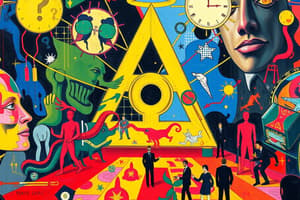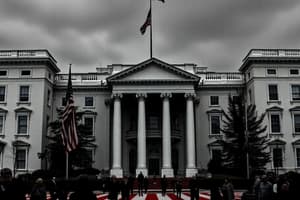Podcast
Questions and Answers
Health conspiracies are related to vaccine misinformation and public health concerns.
Health conspiracies are related to vaccine misinformation and public health concerns.
True (A)
A conspiracy always requires the collaboration of at least three individuals.
A conspiracy always requires the collaboration of at least three individuals.
False (B)
Cognitive biases can lead people to embrace conspiracy theories by rejecting evidence that contradicts their beliefs.
Cognitive biases can lead people to embrace conspiracy theories by rejecting evidence that contradicts their beliefs.
True (A)
Pattern recognition is a characteristic of conspiracy theories that helps people connect unrelated events.
Pattern recognition is a characteristic of conspiracy theories that helps people connect unrelated events.
Counteracting conspiracy theories involves promoting emotional responses to validate beliefs.
Counteracting conspiracy theories involves promoting emotional responses to validate beliefs.
The Watergate Scandal is a notable historical conspiracy involving election manipulation.
The Watergate Scandal is a notable historical conspiracy involving election manipulation.
Conspiracy theories can deepen societal polarization and lead to mistrust among people.
Conspiracy theories can deepen societal polarization and lead to mistrust among people.
Fact-checking initiatives are a method for reducing the spread of false narratives related to conspiracy theories.
Fact-checking initiatives are a method for reducing the spread of false narratives related to conspiracy theories.
Flashcards are hidden until you start studying
Study Notes
Definition of Conspiracy
- A conspiracy involves a secret plan by a group to do something unlawful or harmful.
- It typically requires collaboration between at least two individuals.
Types of Conspiracy Theories
-
Political Conspiracies
- Involves government events, such as elections being manipulated or officials collaborating in secret.
-
Cultural Conspiracies
- Deals with societal events and narratives, such as media control or cultural manipulation.
-
Historical Conspiracies
- Concerns historical events that are interpreted as being influenced by hidden forces (e.g., assassination of key figures).
-
Health Conspiracies
- Relates to medical practices and public health information, e.g., vaccine misinformation.
Characteristics of Conspiracy Theories
-
Distrust in Official Accounts
- Belief that official sources are withholding truth.
-
Pattern Recognition
- Tendency to perceive connections or patterns between unrelated events.
-
Appeal to Emotion
- Often capitalizes on fear, suspicion, or anxiety.
-
Use of Anecdotal Evidence
- Relies on personal stories or isolated events rather than empirical data.
Psychological Factors
-
Cognitive Biases
- Confirmation bias leads individuals to accept information that supports their beliefs and dismiss contrary evidence.
-
Social Identity
- Group belonging can reinforce belief in conspiracy theories, fostering in-group solidarity against perceived threats.
Social Impact
-
Polarization
- Can deepen divides within society, leading to mistrust and conflict.
-
Behavioral Consequences
- May affect public health measures and political engagement due to skepticism toward authorities.
Notable Historical Conspiracies
-
Watergate Scandal
- Involvement of President Nixon’s administration in a cover-up of break-in at the Democratic National Committee headquarters.
-
Assassination of JFK
- Various theories questioned the lone gunman narrative, suggesting broader implications of political figures or groups.
-
COVID-19 Origin Theories
- Speculations about the virus's creation and spread, implicating governments or organizations without solid evidence.
Counteracting Conspiracy Theories
-
Promoting Critical Thinking
- Education on logical reasoning helps individuals analyze claims critically.
-
Fact-checking Initiatives
- Resources and tools that verify information can reduce the spread of false narratives.
-
Open Communication
- Encouraging transparency from institutions can mitigate distrust and reduce the appeal of conspiracy theories.
Definition of Conspiracy
- A secret plan by a group to do something unlawful or harmful
- Requires collaboration between at least two individuals
Types of Conspiracy Theories
- Political Conspiracies involve government events such as election manipulation or secret collaborations between officials.
- Cultural Conspiracies deal with societal and narrative events, such as media control or cultural manipulation.
- Historical Conspiracies concern historical events that are interpreted as being influenced by hidden forces.
- Health Conspiracies relate to medical practices and public health information.
Characteristics of Conspiracy Theories
- Distrust in Official Accounts: Belief that official sources are withholding the truth.
- Pattern Recognition: Tendency to perceive connections or patterns between unrelated events.
- Appeal to Emotion: Capitalizes on fear, suspicion, or anxiety.
- Use of Anecdotal Evidence: Relies on personal stories or isolated events rather than empirical data.
Psychological Factors
- Cognitive Biases: Confirmation bias leads individuals to accept information that supports their beliefs and dismiss contrary evidence.
- Social Identity: Group belonging can reinforce belief in conspiracy theories, fostering in-group solidarity against perceived threats.
Social Impact
- Polarization: Deepens divides within society, leading to mistrust and conflict.
- Behavioral Consequences: Affects public health measures and political engagement due to skepticism toward authorities.
Notable Historical Conspiracies
- Watergate Scandal: President Nixon's administration's involvement in a cover-up of a break-in at the Democratic National Committee headquarters.
- Assassination of JFK: Various theories questioned the lone gunman narrative, suggesting broader implications of political figures or groups.
- COVID-19 Origin Theories: Speculations about the virus's creation and spread, implicating governments or organizations without solid evidence.
Counteracting Conspiracy Theories
- Promoting Critical Thinking: Education on logical reasoning helps individuals analyze claims critically.
- Fact-Checking Initiatives: Resources and tools for verifying information can reduce the spread of false narratives.
- Open Communication: Encouraging transparency from institutions can mitigate distrust and reduce the appeal of conspiracy theories.
Studying That Suits You
Use AI to generate personalized quizzes and flashcards to suit your learning preferences.




